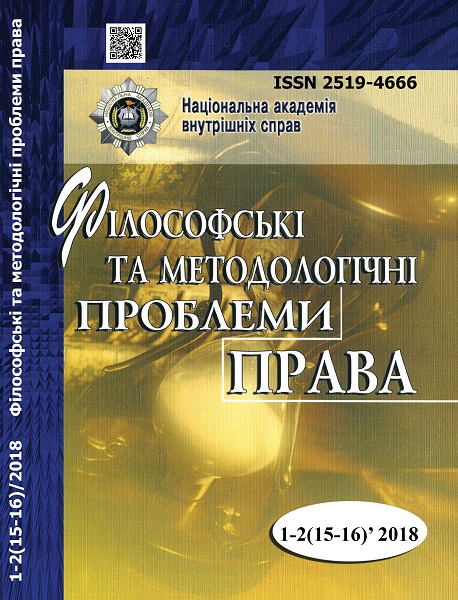Judiciary in Ukraine (X–XVIII centuries): Philosophical and Historical Analysis
Abstract
The article is devoted to the study of issues related to the emergence and development of the judiciary in the medieval Ukraine. The author pays particular attention to the philosophical and legal aspects of the administration of justice and the formation of the foundations of the activity of the judicial authorities during the Kievan Rus, their influence on the proceedings of the Grand Duchy of Lithuania and the Cossack state. According to the results of the research, the author makes the following conclusions. The judiciary in Ukraine has a long history of formation and development. Although it is commonly accepted in scientific circles that it was initiated in the times of Kievan Rus, in fact its roots reach much further in the millennia. In spite of the significant influence of the theological canons of Byzantium, in the philosophy of the ancient secular (both public and private) law, the ideology of the protection of universal human values, in their modern sense, was reflected largely. In Ukraine, during the Lithuanian-Polish era, the living standards of customary law, the traditions of military democracy, religion, and culture, which laid the foundation for political projects and programs of Ukrainian hetmans, remained viable. On this basis, the ideas of the republican system of the Cossack state, with a clear division of power, rights and freedoms of society, and their constitutional consolidation, were born for the medieval Europe. An integral part of the law in the Ukrainian lands during the Cossack state was «Cossack law» – a set of legal practices that acted in Zaporizhzhya Sich and acted as «official» sources of law, guided by which courts made decisions in cases in accordance with ancient customs, verbal law and common sense. Attempting to codify the norms of the Cossack public and private law and reform the Hetmanateʼs judicial system, at one time the authors of the collection «The rights that the Little Russian people are judging» and the last Hetman of Ukraine K. Razumovsky. The result of the deliberate consolidation of power in the imperial Russia was the final absorption of the annexed Ukrainian lands. Expansion demanded subjugation of state life to military and administrative-police interests, and thus did not tolerate, unlike Western Europe, nor traditions of legal education, nor corporations of privileged and influential judges.
Downloads
Abstract views: 150 PDF Downloads: 3418
Copyright (c) 2019 Philosophical and Methodological Problems of Law

This work is licensed under a Creative Commons Attribution-NonCommercial-NoDerivatives 4.0 International License.
- Authors reserve the right to authorship of their own work and transfer to the magazine the right of the first publication of this work under the terms of the Creative Commons Attribution License, which allows other persons to freely distribute published work with mandatory reference to authors of the original work and the first publication of an article in this magazine.
- Authors have the right to enter into separate additional agreements on non-exclusive dissemination of the work in the form in which it was published in the journal (for example, to post an article in the institution's repository or to publish as part of a monograph), provided that the link to the first publication of the work in this journal is maintained.
- The journal's policy allows and encourages the posting of articles by authors on the Internet (for example, in electronic storehouses of institutions or on personal websites), both before the submission of this manuscript to the editorial office and during its editorial processing, as this contributes to the creation of a productive scientific discussion and positively affects the efficiency and dynamics of citing the published work.




